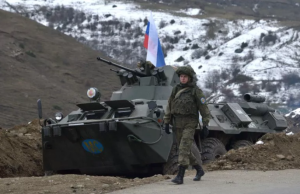
There is no space for U.S.-Russian competition in the ongoing negotiations between Azerbaijan and Armenia, one senior diplomat has warned, as the two long-time rivals chart a path to peace amid deadly border tensions and significant regional turbulence.
“We should do it by ourselves,” Elin Suleymanov—Azerbaijan’s ambassador to the U.K., its former representative in the U.S., and one of Baku’s leading foreign policy spokespeople—told Newsweek in an interview at the country’s mission in London. “We need to learn to live together.”
“If America acts as an honest broker and provides a platform the way that Chancellor [Olaf] Scholz did, fantastic,” he added, referring to recent talks in Munich.
“If someone—including the United States but not just the United States—tries to pursue its own interests or confrontations with other states, be it Russia or anybody else, in manipulating the peace talks or peace agreement, that doesn’t help anybody, including the Armenians. And actually, it undermines the U.S.’ own position.”
A State Department spokesperson told Newsweek that the U.S. “strongly supports efforts to reach a durable and dignified peace, and we stand ready to help facilitate this process.”
“Direct dialogue between Armenia and Azerbaijan is essential to resolving this longstanding conflict,” the spokesperson added. “We welcome any good-faith engagements that bring peace and stability to the people of the South Caucasus and that allow the two countries to continue direct dialogue, including bilaterally and with international partners, regardless of where those talks happen or who is hosting.”
“That being said, we have seen Russia’s repeated, devastating aggression against Ukraine, continued occupation of Georgia’s sovereign territory, and destabilizing activities regionally and around the globe. We cannot view Russia as a trustworthy or good-faith ally or partner in the South Caucasus or elsewhere.”
Great Power Rivals
Wedged between Russia, Turkey, and Iran, the South Caucasus region is tense and strategically important. The region is “undergoing a geopolitical transformation” amid the war on Ukraine and the end of the Nagorno-Karabakh conflict, wrote Emil Avdaliani for the Carnegie Endowment for International Peace in February. “The process could yield benefits for the West.”
